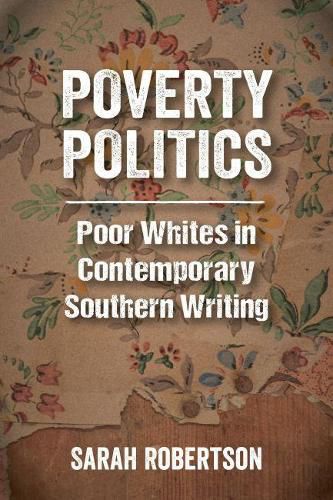Readings Newsletter
Become a Readings Member to make your shopping experience even easier.
Sign in or sign up for free!
You’re not far away from qualifying for FREE standard shipping within Australia
You’ve qualified for FREE standard shipping within Australia
The cart is loading…






This title is printed to order. This book may have been self-published. If so, we cannot guarantee the quality of the content. In the main most books will have gone through the editing process however some may not. We therefore suggest that you be aware of this before ordering this book. If in doubt check either the author or publisher’s details as we are unable to accept any returns unless they are faulty. Please contact us if you have any questions.
Representations of southern poor whites have long shifted between romanticization and demonization. At worst, poor southern whites are aligned with racism, bigotry, and right-wing extremism, and, at best, regarded as the passive victims of wider, socioeconomic policies. In Poverty Politics: Poor Whites in Contemporary Southern Writing, author Sarah Robertson pushes beyond these stereotypes and explores the impact of neoliberalism and welfare reform on depictions of poverty. Robertson examines representations of southern poor whites across various types of literature, including travel writing, photo-narratives, life-writing, and eco-literature, and reveals a common interest in communitarianism that crosses the boundaries of the US South and regionalism, moving past ideas about the culture of poverty to examine the economics of poverty. Included are critical examinations of the writings of southern writers such as Dorothy Allison, Rick Bragg, Barbara Kingsolver, Tim McLaurin, Toni Morrison, and Ann Pancake.
Poverty Politics includes critical engagement with identity politics as well as reflections on issues including Hurricane Katrina, the 2008 financial crisis, and mountaintop removal. Robertson interrogates the presumed opposition between the Global North and the Global South and engages with microregions through case studies on Appalachian photo-narratives and eco-literature. Importantly, she focuses not merely on representations of southern poor whites, but also on writing that calls for alternative ways of reconceptualizing not just the poor, but societal Measures of time, value, and worth.
$9.00 standard shipping within Australia
FREE standard shipping within Australia for orders over $100.00
Express & International shipping calculated at checkout
This title is printed to order. This book may have been self-published. If so, we cannot guarantee the quality of the content. In the main most books will have gone through the editing process however some may not. We therefore suggest that you be aware of this before ordering this book. If in doubt check either the author or publisher’s details as we are unable to accept any returns unless they are faulty. Please contact us if you have any questions.
Representations of southern poor whites have long shifted between romanticization and demonization. At worst, poor southern whites are aligned with racism, bigotry, and right-wing extremism, and, at best, regarded as the passive victims of wider, socioeconomic policies. In Poverty Politics: Poor Whites in Contemporary Southern Writing, author Sarah Robertson pushes beyond these stereotypes and explores the impact of neoliberalism and welfare reform on depictions of poverty. Robertson examines representations of southern poor whites across various types of literature, including travel writing, photo-narratives, life-writing, and eco-literature, and reveals a common interest in communitarianism that crosses the boundaries of the US South and regionalism, moving past ideas about the culture of poverty to examine the economics of poverty. Included are critical examinations of the writings of southern writers such as Dorothy Allison, Rick Bragg, Barbara Kingsolver, Tim McLaurin, Toni Morrison, and Ann Pancake.
Poverty Politics includes critical engagement with identity politics as well as reflections on issues including Hurricane Katrina, the 2008 financial crisis, and mountaintop removal. Robertson interrogates the presumed opposition between the Global North and the Global South and engages with microregions through case studies on Appalachian photo-narratives and eco-literature. Importantly, she focuses not merely on representations of southern poor whites, but also on writing that calls for alternative ways of reconceptualizing not just the poor, but societal Measures of time, value, and worth.